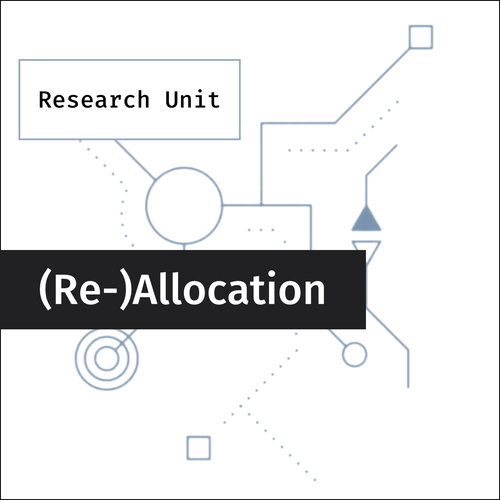Research Unit (Re-)Allocation
For the (re-)allocation of goods and life chances, liberal scripts involve rules and goals in the face of social and material scarcities. The liberal script assigns the free market as the key mechanism of allocation, which invariably results in uneven outcomes. Welfare states attempt to reduce inequalities via, for instance, progressive taxation.
The RU (Re-)Allocation addresses three areas concerning resource allocations:
1. Internal/external contestationsEfforts to address one form of inequality may negatively impact another inequality. For instance, efforts to increase gender equality may lead to greater inequality across social class. In addition, the sustainability of welfare states becomes questionable when faced with reduced tax bases due to declining birth rates, ageing populations, and tax evasion. Adding to that complexity are the rights and opportunities for immigrants in a given country.
2. CausesThe liberal script’s free market principle in the form of globalization tends to increase inequality within and among states, while also placing greater concentrations of wealth in fewer hands. In addition, demographic changes stemming from, for example, migration and an ageing society further complicate resource allocation. Technology and digitalization – by-products themselves of the liberal script – bring forth benefits to society while also exacerbating inequality.
3. ConsequencesAre the current contestations part of a longer-term social history, or are they more a product of a post-Cold War world? What happens to public support for the welfare state as inequality increases? RU Re-Allocation will investigate whether disputes over compromised equal opportunities, constrained social expenditures and migrant integration are mere short-term contestations or if they possess greater longevity.
With its focus on inequality, the RU (Re-)Allocation ultimately tackles a fundamental challenge of the 21st century. Is the crisis of the liberal script a crisis of capitalism? Are capitalism and democracy an elective affinity or a contradiction that cannot be overcome? The study of social inequality, demographic changes, and technological innovation will allow us to shed light on this issue and on how inequality combines with other pressures on the liberal script, such as climate change, (forced) migration, or demands for political and social inclusion.
Research Projects
Reinterpreting the Alternative Script? War in Ukraine, State-sponsored Narratives of Block Building in Authoritarian Countries and their Public PerceptionProf. Dr. Genia Kostka, Prof. Dr. Alexander Libman
Sep 01, 2022 — Aug 31, 2025 Objects from Afar and Sustainable Liberal Identity - The Contestation of Material Representation in National Museums of the Global North
Prof. Dr. Philipp Lepenies, Prof. Dr. Marianne Braig, Prof. Dr. Gülay Çağlar, Prof. Dr. Andreas Eckert, Prof. Dr. Jessica Gienow-Hecht
Nov 01, 2022 — Aug 31, 2025 Leader Types and (Liberal?) Narratives of the COVID-19 Pandemic
Prof. Mark Hallerberg, PhD, Prof. Dr. Slava Jankin, Prof. Dr. Amrita Narlikar
Sep 01, 2021 — Aug 31, 2024 Science Friction: Science Friction: Patterns, Causes and Effects of Academic Freedom Contestations
Prof. Dr. Tanja A. Börzel, Prof. Mattias Kumm, S.J.D. (Harvard), Prof. Dr. Katrin Kinzelbach
Sept 01, 2021 – Aug 31, 2024
Regional Conferences on Contestations of the Liberal Script With the Cluster's International Partners
Prof. Dr. Tanja A. Börzel, Prof. Dr. Michael Zürn , Prof. Dr. Thomas Risse
Apr 01, 2021 — Mar 31, 2024 The Challenge to the Challenge: The Belt and Road Initiative’s Implications for Liberal Trade and (Digital) Finance and the Response in Other Countries
Prof. Mark Hallerberg, Prof. Dr. Amrita Narlikar, Felix Garten, Nora Kürzdörfer
Sep 01, 2020 — Feb 14, 2024 High Hopes and Broken Promises: Young Adult Life Courses in Senegal
Prof. Dr. Andreas Eckert, Prof. Dr. Anette Fasang, Dr. Noella Binda Niati
Aug 07, 2020 — Aug 06, 2023 Political leaders and gender equality: Can female top leaders reduce inequalities in political participation?
Prof. Dr. Heike Klüver, Prof. Dr. Jae-Jae Spoon (University of Pittsburgh)
Jun 01, 2022 — Dec 31, 2022 COVID-19 as a challenge to the liberal script
Prof. Dr. Heike Klüver
Feb 16, 2022 — Dec 31, 2022 The Not-So-Universal Declarations: Types and Effects of Human Rights Rhetoric in the UN General Assembly
Prof. Dr. Slava Jankin, Dr. Olga Gasparyan, Dr. Niheer Dasandi
Jun 01, 2022 — Dec 31, 2022 A Global History of Unemployment: The Search for Global Full Employment, 1940-1990
Dr. Aaron Benanav
Dec 01, 2021 — Dec 01, 2022 Social Inequalities, Migration and the Rise of Populist Parties
Prof. Dr. Johannes Giesecke, Prof. Dr. Heike Klüver, Prof. Dr. Martin Kroh, Dr. Lukas Stoetzer
Sep 01, 2019 — Aug 31, 2022 Populism and Perceived Inequality
Prof. Dr. Johannes Giesecke, Prof. Dr. Heike Klüver, Dr. Lukas Stoetzer
Jan 01, 2021 — Dec 31, 2021 Responding to the (Populist) Right: How Moderate Parties Can Win Back Voters
Prof. Dr. Heike Klüver, Prof. Dr. Petra Schleiter, Dr. Lukas Stoetzer
Jan 01, 2021 — Dec 31, 2021 The Politics of Public Allocation of Scarce Goods
Prof. Dr. Johannes Giesecke, Prof. Macartan Humphreys, Prof. Dr. Heike Klüver, Dr. Ferdinand Geißler, Felix Hartmann
Jan 01, 2021 — Dec 31, 2021 Essential Workers, Decent Work: A History of Labor Force Categories
Prof. Dr. Andreas Eckert, Dr. Aaron Benanav
Apr 01, 2021 — Dec 31, 2021 Financial (re-)allocation after Covid-19: Global financial flows to China and its implications for the liberal global financial order
Dr. Johannes Petry
Apr 01, 2021 — Sep 01, 2021 A 'Common Sense Revolution'?
Prof. Dr. Tanja A. Börzel, Prof. Dr. Miriam Hartlapp , Dr. Lukas Obholzer
Apr 01, 2019 — Dec 31, 2019

